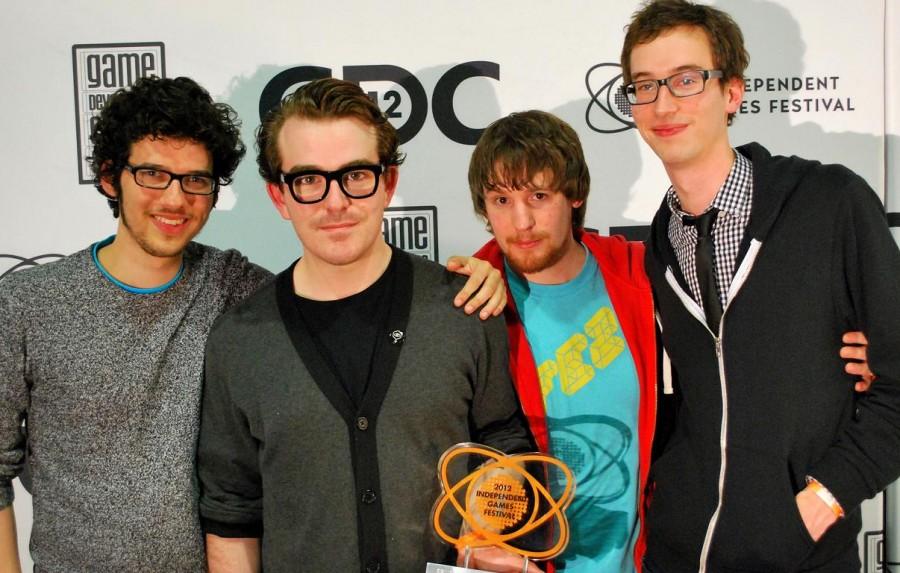Basement development
The four man development team for “Fez”, collectively called Polytron. They had just won an award for the release of the game.
March 4, 2015
I was watching “Indie Game: The Movie” which is undoubtedly one of my favorite documentaries of all time. It inspired me to talk about an often overlooked topic for the majority of gamers. Now while I am a PC gamer, I’m not blind to the fact that the majority of people aren’t. Unfortunately this topic pertains mostly to PC gamers, seeing as mainly popular AAA titles are what’s played on consoles.
In case you haven’t picked up on it yet, I’m talking about indie games, or games developed completely independent of funding from a publisher. Generally these games are developed by gamers, for gamers, with low budgets, low price tags, and if they’re good enough, huge sales. In fact, in the past few years, some independent games have made their way into the upper listings of the best video games of all time. And that begs the question: why?
The smaller the budget, the seemingly lesser the game, which doesn’t explain why multi-million dollar games are generally considered garbage while games that were developed by a couple of friends in someone’s mom’s basement change the face of video games.
I believe the answer comes down to passion. Video gamers used to be a niche and have been popularized in the past decade or so, and have morphed into more of an industry than a hardcore crowd. With the wide acceptance of video games came the rise of corporations ready to take advantage of an industry.
In case you didn’t know, the money being made in the video game industry is huge. Last year, the whole industry grossed 86.8 billion dollars, according statista.com. Seeing those kind of number makes CEOs all over turn green with envy and opens a very easy hole for them to exploit.
Large budget games have declined over the years simply because of laziness. The money meant to spend of development is pushed towards extravagant marketing, and developers are pushed by publishers to create a cookie cutter game in a short amount of time to maximize profits. This lends to have unfinished, buggy games, that not only are absolutely terrible to play, but also come with a hefty price tag, with the old wrinkled hand of the publisher reaching into your pocket and bleeding your wallet dry.
The issue has become worse with companies selling gamers more of a platform than a game: with a half finished game holding a standard $59.99 price tag and the rest of content reserved for numerous release of downloadable content (DLC).
So why do indie games matter in this scheme? Well…for a ton of reasons. Being completely free from influence of a money hungry publisher, the game is created in the exact way the developer intended it to be. And it’s not a coincidence that many of these developers are gamers themselves. The game isn’t cookie cutter, and it allows developers to bring unique concepts to the table because passion is more of a concern than sales.
What’s really interesting is the low price tag on these games. Many indie games come in under $14.99, which supplies the developers plenty to not only live on, but to develop more game, which makes the $59.99 price tag of half-finished AAA kind of a joke.
This isn’t to say that all Indie games are good and all AAA games are bad because that isn’t true. Many indie games are absolutely terrible, but the thing is, they suffer from it. If an indie game is terrible, it simply doesn’t get sales. The same isn’t true for AAA titles. Due to the insanely large budget, the marketing campaigns for them is insane and leads to create hype over a broken product, sucking up an enormous amount of sales before any person has the knowledge that they’ve just been robbed, like in the ever redundant “Call of Duty”s and countless copy and paste sport games plaguing the scene.
Indie games provide a vision of the correct way to run any industry, where quality of work is judged over quality of hype. Indie games have perfected the idea that “if it’s good, people will come.” This is a rare chance that comes in the mainstream entertainment industry and I personally think it’s the kind of movement that can really start a revolution if supported. It’s already grown legs with popular games like “Super Meat Boy,” “Shovel Knight,” and “Braid” gaining mainstream support, and it is our responsibility to ensure it gains more ground.
Nothing will change over night, and some people are convinced that this isn’t the correct route to take, but no one likes getting robbed of their money, and supporting indie developers ensures that gamers will no longer get taken advantage of for their passion.













